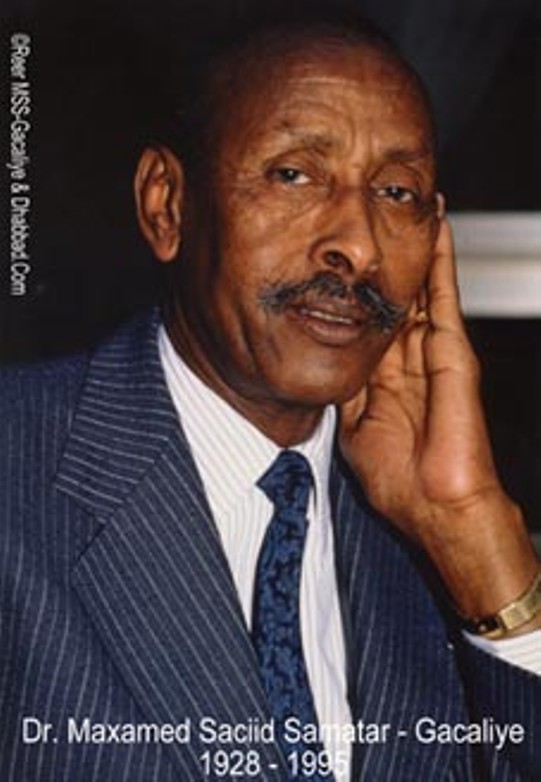Mogadishu (HAN) March 30, 2014- Sharing diplomatic files: What we know, what we don’t know To begin with; there is the question of why the Roobdoon Forum lays so much emphasis now on late ambassador Mohamed Said Samantar’s interview with the French quarterly review journal, Afrique Contemporaine. The simple answer is: the Forum devotes so much of its review to materials that deemed to the Forum as a milestone to the contemporary history of Somalia. In this interview, diplomat Samantar treats numerous complex and controversial issues, from Somali nationalism to political confederation of the Horn of Africa.
Mohamed Said Samantar (Gacaliye), who fell out with President Siyaad Barre in early 1980s, articulates his own account of Somali polity. His responses are meticulous and detailed analysis of Somali’s recent history. For him, the Somali unity was/and still is being undermined by the divisive rivalry between Somali elites whom he classifies one group as Italianized Somali intellectual class. In Somali politics, it is often underrated this notion of Second-language syndrome, whereby ESL/ISL became the differentiating mark of the Somalis. Can we say that the Italian-speaking Somali elites of the 1960s did try, as Samantar argues, to make Somalia an Italian-speaking country and, in the process, failed Somalia to become a united Somali-speaking country? In other words, is this Anglophone/Italophone elitism mark what appears to be an already unfolding Somali problem between the North and the South?
While the principles of Somali elites of the 1960s were Somali nationalism, Samantar’s account suggests that the Italian-educated leadership were under pressure to vigorously tow the Italian government line. Probably, this line of making Somalia an Italophone seems to be cherished by few southern elites who were only concerned in their careers. Safe-guarding the link with Italy, therefore, became their priority, compromising any dose of Realpolitik that could accelerate the unification of the Somali-speaking people in the Horn of Africa.
It could as well be the cost of retaining this Somali-Italian link that resulted in the image of the present Somali situation. Somali elites of the 1960s wished to have their cake and eat it too with regard to Somali unity. The cost of retaining the illusory of Italian-speaking country for too long paved the way for many concerned Somali politicians to re-think another geopolitical approach to unite the dispersed Somalis in the region. In this interview, Ambassador Samantar expresses his feelings, imagining a political confederation of Somalia, Ethiopia, Djibouti and Eritrea.
Samantar also discusses the events that led to the 1969 Revolution, stating that Prime Minister Egal’s renunciation of “Somali people’s right to self-determination” was the genesis of the military take over. He also traces the devastating policies adopted by Siyaad Barre, both domestic and international affairs. At this point, the Forum presents to its readership the complete interview with the Ambassador by Ahmed Dehli of AFRIQUE CONTEMPORAINE.
Interview with opposition leader Mohamed Said Samantar [Gacaliye] by Ahmed Dehli, in Paris in March 1990; the first six paragraphs are AFRIQUE CONTEMPORAINE
In this interview, which took place in March 1990, Mohamed Said Samantar explains the problems currently facing Somalia and discusses the prospects for change that might help solve those problems.
Ahmed Dehl: To conclude this interview, how do you think the situation in the Horn of Africa may develop?
Ambassador Samantar: I feel that if a system of political confederation linking Somalia, Ethiopia, Djibouti, and Eritrea were someday established on the basis of the right of peoples to self-determination, the Horn of Africa would be transformed into an oasis of peace, stability, and prosperity. If that happened, Somalia would rediscover its lost unity, Ethiopia would have access to both the Red Sea and the Indian Ocean, Eritrea could freely choose its destiny, and Djibouti would find tranquility without being coveted by its big sisters. Peace could finally be established in that part of the African continent, and that is the sine qua non condition for its development, which alone will enable the inhabitants to view the future with optimism and hope.
Sources: Paris AFRIQUE CONTEMPORAINE in French, Vol. 154 No. 2, 1990 pp 54-59
–
Speaking Freely is an Geeska Afrika Online and Horn of Africa Newsline (HAN) feature that allows guest writers to have their say. if you are interested in contributing or sending News, Views and Comments. Please email at: han@geeskaafrika.com
HAN & Geeska Afrika Online (1985-2014), the oldest free independent Free Press in the region, brings together top journalists from across the Horn of Africa. Including Ethiopia, Somalia, Eritrea, Sudan, Djibouti, South Sudan, Uganda, Kenya, Oromo, Amhara, Somali, Afar and Harari. Plus, we have daily translations from 150 major news organizations in the Middle East and East African regions. Contact at news@geeskaafrika.com

